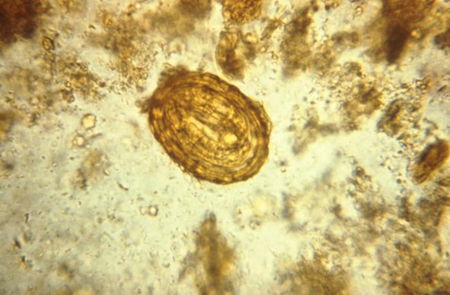Investigations
1st investigations to order
stool microscopy
Test
The most reliable way to diagnose ascariasis.[15] Should be ordered for patients suspected of intestinal ascariasis, such as returning travellers, expatriates, and children adopted from endemic regions, and for those in endemic regions with intestinal obstruction.
When present on direct examination or in a concentrated specimen, eggs typically appear as pebbled, yellow-brown spheres or ovals measuring 60 to 70 micrometres.[1] Unfertilised eggs may be more difficult to identify, because of their atypical size and appearance.[Figure caption and citation for the preceding image starts]: Photomicrograph depicting a fertilised egg of the parasite Ascaris lumbricoidesPublic Health Image Library, CDC [Citation ends].
Negative result does not exclude infection with ascariasis, particularly during migratory phases, in male-only worm infection, and if performed before adults are fully grown (8 weeks after exposure).
Due to the large number of eggs produced by each adult female worm, examination of a single stool sample is usually diagnostic. Stool microscopy yields false-negative results, however, in infections with single-sex adults or juvenile worms.[24][25]
Result
presence of eggs in stool
chest x-ray
Test
Should be ordered in patients suspected of having eosinophilic pneumonitis/Loeffler's syndrome (i.e., patients with new-onset asthma or fever and cough who have recently returned from travel in an ascariasis-endemic region).
Result
diffuse mottling of lungs and prominence of peribronchial regions may be noted during pneumonitis; may reveal patchy pulmonary infiltrates during larval migration
abdominal x-ray
Test
Should be considered for patients with signs of intestinal obstruction who are from areas with endemic ascariasis.
Result
patients with intestinal obstruction may have dilated loops of bowel, air fluid levels, or multiple linear images of worms within the obstructive bolus
Investigations to consider
sputum/gastric aspirate microscopy
Test
Usually positive in patients with symptomatic eosinophilic pneumonitis/Loeffler's syndrome; however, this does not aid diagnosis of intestinal ascariasis.
Result
larvae or Charcot-Leyden crystals may be found on microscopy of sputum or gastric aspirate of patients during the larval migratory phase
FBC
Test
May complement sputum/gastric aspirate microscopy and chest x-ray in patients suspected of having eosinophilic pneumonitis/Loeffler's syndrome.
Result
peripheral blood eosinophilia of >20% may occur during migration of larvae through blood and lungs of infected patients
contrast study
Test
Can be performed if abdominal x-ray suggests small bowel obstruction.
Result
mass of adult worms in the gastrointestinal tract, or single worms obstructing the hepatobiliary tree
barium follow-through
Test
Commonly performed in patients who have unexplained abdominal pain or weight loss. Ascarids may be an incidental or an expected finding depending on the differential diagnoses for the patient.
Result
adult worms are seen as linear filling defects outlined by contrast media, or, if the worms themselves ingest barium, as curved linear densities within the intestinal lumen
abdominal ultrasound
Test
Can be performed if abdominal x-ray suggests small bowel obstruction. Should be considered in patients from areas with endemic ascariasis with signs of intestinal obstruction, biliary colic, cholecystitis, cholangitis, or suspected hepatic abscess.
Result
patients with intestinal obstruction or hepatobiliary pancreatic ascariasis may show findings consistent with worms
abdominal CT
Test
Can be performed if abdominal x-ray suggests small bowel obstruction.
Result
patients with intestinal obstruction or hepatobiliary pancreatic ascariasis may show findings consistent with worms
endoscopic retrograde cholangiopancreatography (ERCP)
Test
Should be performed in cases of biliary colic, cholecystitis, cholangitis, or hepatic abscess in which Ascaris is suspected. This procedure can be diagnostic and therapeutic.
Result
patients with hepatobiliary pancreatic ascariasis will have worms visible at ERCP in the pancreatic and biliary ducts
Emerging tests
antibodies to Ascaris lumbricoides
Test
Antibodies to Ascaris lumbricoides have been used in epidemiological studies but are rarely (if ever) used to diagnose individual infections.
Result
presence of antibodies
serum IgE
Test
Migrating larvae are associated with elevated serum IgE levels, tissue eosinophilia, and mastocytosis.
Result
elevated
interleukin (IL)-4, IL-5, and IL-13
urine-based gas liquid chromatography
Test
This technique has been developed, although its use remains limited to research.[41]
Result
2-methyl butyramide and 2-methyl valeramide (derivatives of end products of the carbohydrate metabolism of Ascaris)
Use of this content is subject to our disclaimer